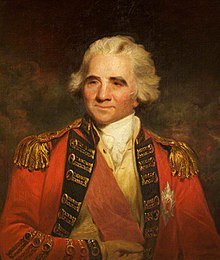Ralph Abercrombie
| Sir Ralph Abercromby | |
|---|---|

Sir Ralph Abercromby, by John Hoppner
|
|
| Born |
7 October 1734 Menstrie, Clackmannanshire, Scotland |
| Died | 28 March 1801 (aged 66) Alexandria, Egypt |
| Buried at | Fort Saint Elmo, Valletta, Malta (35°54′10″N 14°31′12″E / 35.902722°N 14.519889°ECoordinates: 35°54′10″N 14°31′12″E / 35.902722°N 14.519889°E) |
| Allegiance |
|
| Service/branch |
|
| Years of service | 1756–1801 |
| Rank | Lieutenant-General |
| Battles/wars | |
| Awards | KCB |
| Relations | Brother: Alexander Abercromby, Lord Abercromby and General Sir Robert Abercromby |
| Other work |
Member of Parliament Governor of Trinidad Lord Lieutenant of Clackmannanshire |
Irish Rebellion of 1798
French campaign in Egypt and Syria
Sir Ralph Abercromby KB (sometimes spelt Abercrombie) (7 October 1734 – 28 March 1801) was a Scottish soldier and politician. He rose to the rank of lieutenant-general in the British Army, was noted for his services during the Napoleonic Wars, and served as Commander-in-Chief, Ireland.
He twice served as MP for Clackmannanshire, and he was appointed Governor of Trinidad.
He was the eldest son of George Abercromby of Tullibody, Clackmannanshire, and a brother of the advocate Alexander Abercromby, Lord Abercromby and General Sir Robert Abercromby. He was born at Menstrie Castle, Clackmannanshire. Educated at Rugby and at the University of Edinburgh, he was sent to Leipzig University in 1754 to study civil law with a view to career as an advocate.
Abercromby was a Freemason. He was a member of Canongate Kilwinning Lodge No 2, Edinburgh, Scotland.
...
Wikipedia
